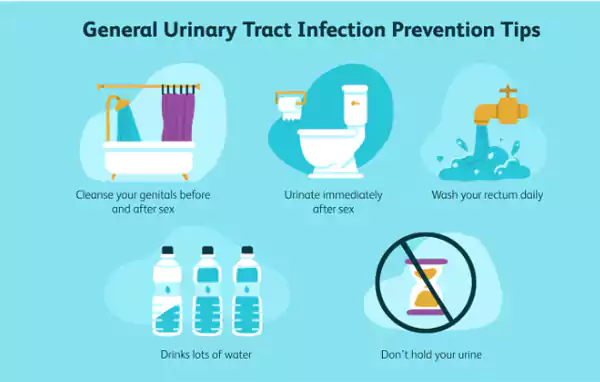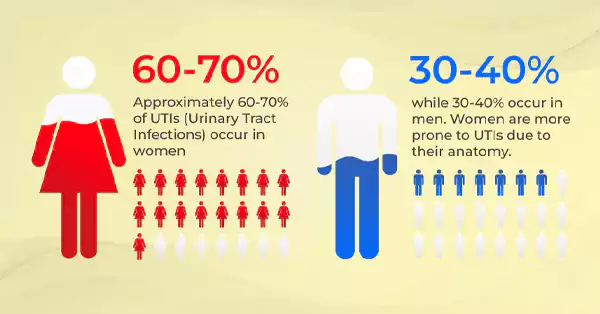Unraveling the Mystery of UTIs and Understanding, Prevention, and Remedies for Women

Urinary Tract Infections (UTIs) are a common and often painful condition that predominantly affects women. While they can be uncomfortable and even disruptive to daily life, UTIs are manageable and preventable with the right knowledge and strategies.

In this comprehensive guide, we’ll delve into the world of UTIs for women, covering everything from understanding the causes and symptoms to discussing effective prevention measures and remedies to alleviate discomfort.
Understanding UTIs: What are They?
A UTI is an infection that affects any part of the urinary system, including the kidneys, bladder, ureters, and urethra. However, the most common type of UTI is a bladder infection, known as cystitis.
UTIs occur when bacteria, typically Escherichia coli (E. coli) from the intestines, enter the urinary tract. Women are more prone to UTIs than men, primarily due to differences in anatomy—the shorter urethra in women allows bacteria to reach the bladder more easily.
DID YOU KNOW?
An estimated 40% of women will have at least one UTI in their lifetime, as opposed to only 12% of men.
Recognizing the Symptoms
UTIs can manifest in various ways, and the symptoms can range from mild to severe. It’s crucial to recognize the signs early and seek appropriate treatment to prevent complications. Common UTI symptoms in women include:
Frequent Urination
A frequent and persistent urge to urinate, even when the bladder is not full, is a common early symptom of a UTI.
Painful Urination
A burning sensation or pain while urinating is a classic symptom of UTIs. This discomfort can range from mild to severe.
Cloudy, Bloody, or Strong-Smelling Urine
UTIs can cause changes in urine color and odor. If your urine appears cloudy, contains blood, or has a strong, unpleasant smell, it may be indicative of an infection.
Lower Abdominal Pain
Many women with UTIs experience discomfort or a dull ache in the lower abdomen, often around the pelvic area.
Feeling Tired or Shaky
Some women with UTIs report feelings of fatigue or shakiness, which may be accompanied by a general sense of unwellness.
Pressure or Pain in the Lower Back
In more severe cases, UTIs can lead to discomfort in the lower back, indicating a possible kidney infection.
Fever or Chills
A fever and chills may develop if a UTI progresses to involve the kidneys. This is a more serious condition and requires immediate medical attention.

Prevention Strategies
Preventing UTIs is often more straightforward than treating them. Incorporate these strategies into your daily routine to reduce the risk of UTIs:
Stay Hydrated
Drinking plenty of water helps flush out bacteria from the urinary tract. Aim for at least eight glasses of water a day.
Urinate Regularly
Don’t hold in urine for extended periods. Urinate as soon as you feel the urge to help flush out any potential bacteria.
Wipe from Front to Back
When using the toilet, always wipe from front to back to prevent bacteria from the anal area from reaching the urethra.
Empty Your Bladder Before and After Intercourse
Urinating before and after sexual activity can help eliminate any bacteria that may have entered the urethra.
Avoid Irritants
Limit or avoid irritants such as perfumed soaps, douches, and feminine hygiene products that can disrupt the natural balance of the urinary tract.
Wear Breathable Underwear
Choose cotton underwear, which allows for better air circulation and reduces moisture, creating a less favorable environment for bacteria.
Cranberry Products
Some studies suggest that cranberry products, such as 100% cranberry juice or supplements, may help prevent UTIs by preventing bacteria from adhering to the urinary tract lining.
Probiotics
Probiotics containing Lactobacillus strains may support a healthy urinary tract by promoting a balanced microbiome.
Seeking Medical Help
If you suspect you have a UTI, it’s essential to consult a healthcare provider promptly. They will perform a urinalysis to confirm the infection and determine the appropriate course of treatment.
UTIs are typically treated with antibiotics, and it’s crucial to complete the entire course of medication as prescribed, even if symptoms improve, before finishing the antibiotics.

Natural Remedies for UTIs
In addition to medical treatment, some women find relief from UTI symptoms through natural remedies. While these remedies may not replace antibiotics, they can be used as complementary measures:
Hydration
Drinking plenty of water helps flush out bacteria and dilutes urine, reducing the burning sensation during urination.
Cranberry Products
As mentioned earlier, cranberry juice or supplements may help prevent UTIs by inhibiting bacteria’s ability to adhere to the urinary tract lining.
Probiotics
Probiotics containing Lactobacillus strains may help maintain a balanced urinary tract microbiome.
D-Mannose
D-mannose, a natural sugar, may help prevent UTIs by preventing bacteria from adhering to the urinary tract walls.
Aromatherapy
Some essential oils, such as tea tree oil, may have antibacterial properties. However, these should be used with caution and proper dilution to avoid skin irritation.
When UTIs Become Recurrent
If you experience recurrent UTIs (more than three within a year), it’s essential to discuss this with your healthcare provider. They may recommend further evaluation, such as a urology consultation or imaging studies, to identify any underlying causes or anatomical issues contributing to the infections.
Conclusion
UTIs are a common concern for women, but with proper understanding, prevention strategies, and prompt medical treatment found on https://hellowisp.com/coupons, they can be managed effectively.
It’s important to identify the signs, seek medical attention when needed, and follow through with prescribed antibiotics. Incorporating natural remedies as complementary measures may provide relief from UTI symptoms and support urinary tract health.
By taking a proactive approach to UTIs, women can maintain optimal urinary health and overall well-being. Remember, your healthcare provider is your best resource for guidance and treatment when dealing with UTIs.










